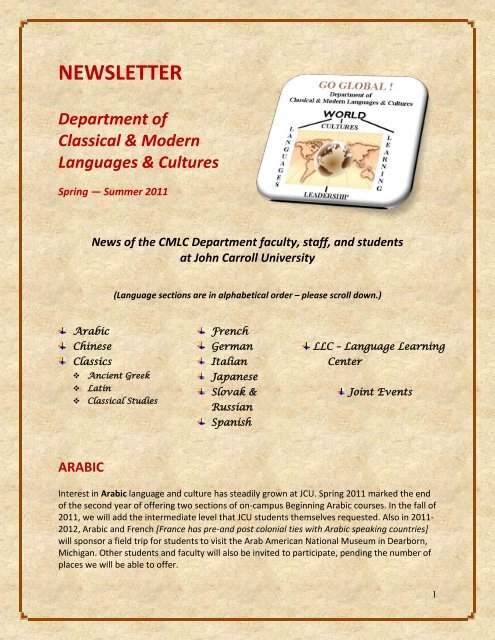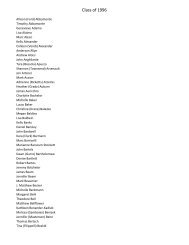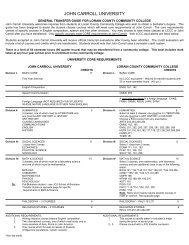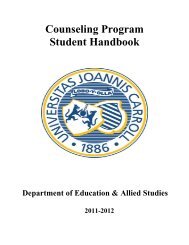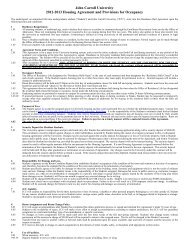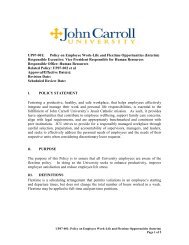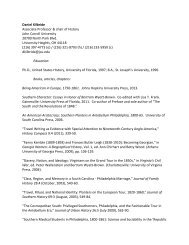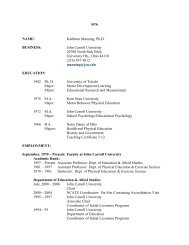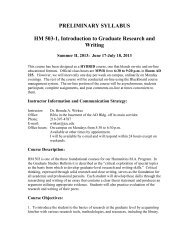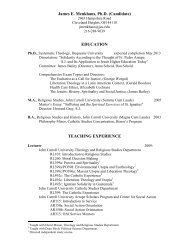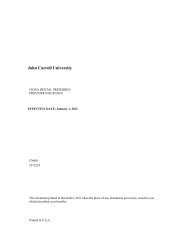Create successful ePaper yourself
Turn your PDF publications into a flip-book with our unique Google optimized e-Paper software.
NEWSLETTER<br />
Department of<br />
Classical & Modern<br />
Languages & Cultures<br />
Spring — Summer <strong>2011</strong><br />
News of the CMLC Department faculty, staff, and students<br />
at <strong>John</strong> <strong>Carroll</strong> <strong>University</strong><br />
(Language sections are in alphabetical order – please scroll down.)<br />
Arabic<br />
Chinese<br />
Classics<br />
Ancient Greek<br />
Latin<br />
Classical Studies<br />
French<br />
German<br />
Italian<br />
Japanese<br />
Slovak &<br />
Russian<br />
Spanish<br />
LLC – Language Learning<br />
Center<br />
Joint Events<br />
ARABIC<br />
Interest in Arabic language and culture has steadily grown at JCU. Spring <strong>2011</strong> marked the end<br />
of the second year of offering two sections of on-campus Beginning Arabic courses. In the fall of<br />
<strong>2011</strong>, we will add the intermediate level that JCU students themselves requested. Also in <strong>2011</strong>-<br />
<strong>2012</strong>, Arabic and French [France has pre-and post colonial ties with Arabic speaking countries]<br />
will sponsor a field trip for students to visit the Arab American National Museum in Dearborn,<br />
Michigan. Other students and faculty will also be invited to participate, pending the number of<br />
places we will be able to offer.<br />
1
Ramez Islambouli<br />
Our Arabic instructors include Professor Ramez Islambouli, a native of Lebanon, who moved to<br />
the United States in 1985 to pursue his academic studies. He holds an undergraduate degree in<br />
biomedical engineering and a graduate degree in bioethics, both from Case Western Reserve<br />
<strong>University</strong>. Besides his affiliation with JCU, he is also an adjunct professor of Islamic law at the<br />
CWRU Law School, and of Islamic Studies in the Dept. of Religious Studies. Also at CWRU, in the<br />
Dept. of Modern Languages and Literature, he is a full-time lecturer and section head of Arabic<br />
language. In addition to teaching Arabic language courses in CMLC here at <strong>John</strong> <strong>Carroll</strong><br />
<strong>University</strong>, he teaches courses on Islamic Studies via the JCU History department. He also<br />
teaches Islamic Studies at Cleveland State <strong>University</strong> and at Cuyahoga Community College. He<br />
serves as a Muslim Chaplain at <strong>University</strong> Hospitals and at Cuyahoga Hills Juvenile Correctional<br />
Facility. Currently he is the President of Uqbah Mosque Foundation in Cleveland.<br />
Sawssan Khoury<br />
Our other Arabic Instructor is Professor Sawssan Khoury. She is a native of Syria, where she<br />
attained her Bachelor of Arts in French Literature at the <strong>University</strong> of Damascus. She<br />
immigrated to the United States with her husband who was pursuing his medical training in<br />
Cleveland, Ohio. There, she received her Master of Arts in French Literature from Kent State<br />
<strong>University</strong>, minoring in Arabic, French and English translation. She has regularly tutored<br />
secondary and tertiary students in the Arabic language, and has taught at Solon Montessori<br />
School for 17 years. She is also active in the Arab community in Cleveland and also Washington,<br />
DC. She has organized several cultural functions, hosting reputable artists including the poets<br />
Nizar Qabbani and Mahmoud Darwish. She served on the management board of Access for five<br />
years, a local civil society organization which helps Arab-Americans attain economic and social<br />
assistance, including the teaching of English as a second language. Since 2008 she has been on<br />
the management board of the Arab-American Anti-Discrimination Committee, the largest<br />
2
grassroots Arab-American organization in the country, whose core objective is the defense of<br />
civil rights and liberties.<br />
CHINESE<br />
Cai Wei<br />
Professor Cai Wei, pictured with her daughter, above, represented JCU at the Asian New Year<br />
Festival in Cleveland’s Asian Town Center - February 5, <strong>2011</strong><br />
We are pleased to announce that JCU now offers Chinese language instruction at the beginning,<br />
intermediate, and advanced levels, an achievement made possible by our Confucius Classroom<br />
program. Our Confucius Classroom is affiliated with the <strong>University</strong> of Pittsburgh’s Confucius<br />
Institute and is a project of Hanban, an arm of the Chinese Ministry of Education that promotes<br />
the study of Chinese language and culture around the world.<br />
Shao Zhenping<br />
In Fall 2010, we welcomed our first Confucius Classroom visiting instructor, Professor Cai Wei,<br />
from Wuhan, Hubei Province, China. This fall, we will welcome Cai Wei’s successor, Professor<br />
Shao Zhenping, as <strong>John</strong> <strong>Carroll</strong>'s new Confucius Classroom instructor. Before coming to JCU,<br />
Professor Shao (whose English name is Sharon Shao) was a Chinese Professor in the Modern<br />
Language Department at St. Vincent College in Latrobe, Pennsylvania. She is completing her<br />
graduate studies at the Faculty of Arts, Wuhan <strong>University</strong>, majoring in Chinese Teaching for<br />
Foreign Learners. Professor Shao has also been awarded many prizes in Chinese Dance<br />
competitions as well as many other Chinese cultural activities.<br />
3
CLASSICS (Ancient Greek, Latin, Classical Studies)<br />
Dr. Gwen Compton-Engle<br />
Dr. Gwen Compton-Engle will be leading a new study tour to Greece during the first two weeks<br />
of January, <strong>2012</strong>.<br />
Dr. Compton-Engle presented a paper entitled: “Doing Funny Things with Costume in Greek Old<br />
Comedy” at the Ancient Drama in Performance conference at Randolph College in October,<br />
2010. The conference took place outdoors in a Greek-style theater and was held in conjunction<br />
with Randolph College’s annual Greek play. Dr. Compton-Engle also presided over a session<br />
about Greek literature at the Ohio Classical Conference, hosted by the Ohio State <strong>University</strong>,<br />
also in October of 2010.<br />
Classics student Adam Foley '11 delivered a paper at the Classical Association Conference at the<br />
<strong>University</strong> of Durham, England in April, <strong>2011</strong>.<br />
Classics student Sam Amos '11 won third prize in Latin Composition in a translation contest<br />
sponsored by Eta Sigma Phi, the Classics Honor Society. This is the third year in a row in which a<br />
JCU classics student has won a prize in this nation-wide contest.<br />
Sam Amos was also accepted into the highly selective MAT program in Latin at the <strong>University</strong> of<br />
Massachusetts-Amherst.<br />
Dr. Kristen Ehrhardt<br />
4
The CMLC department will be welcoming a new Visiting Assistant Professor in Classics, Dr.<br />
Kristen Ehrhardt. She completed her degree in Classics at the <strong>University</strong> of Wisconsin-Madison<br />
in <strong>2011</strong>, with a Ph.D. minor in Art History. Her research interests include Greek and Latin<br />
poetry, the interplay between art and text, and representations of symposia from the eastern<br />
influences on early Greek symposia to later Roman adaptations of feast scenes. At JCU, she will<br />
be teaching courses in Latin, Greek, and Classics.<br />
Dr. Thomas Nevin<br />
Classics Professor Dr. Thomas Nevin will be on leave for the academic year <strong>2011</strong>-<strong>2012</strong> on a<br />
Grauel Faculty Fellowship Award. While on leave, Dr. Nevin will be working on a book-length<br />
manuscript, tentatively titled “The Murder of God.” The work will examine doubt, denial, and<br />
betrayal of Christ among German Protestant thinkers. Dr. Nevin will be living primarily in<br />
France while he conducts his research and writing.<br />
FRENCH<br />
Dr. Hélène Sanko<br />
Darlene Nelson<br />
Dr. Hélène Sanko and Professor Darlene Nelson took a group of ten students to Paris during<br />
Spring Break <strong>2011</strong>. Three relatives accompanied three of the ten students. A total of seventeen<br />
people successfully completed a very memorable tour of Paris and Versailles, and explored<br />
several world famous museums, in particular the Louvre, Carnavalet, Cluny and Gare d’Orsay.<br />
Plans are underway for a possible trip to Provence, in the south of France, for spring break<br />
<strong>2012</strong>.<br />
5
Dr. Hélène Sanko was a presenter at OFLA (Ohio Foreign Languages Association) in Columbus,<br />
Ohio in March, <strong>2011</strong>. Her presentation dealt with French “dictées” [dictations] and their<br />
successful use in teaching and assessment. She also represented a nonprofit French Canadian<br />
Foundation (la Foundation Guerin Lajoie) that specializes in promoting “dictées.” At the<br />
Conference she also distributed posters and literature on the Foundation as well as dictée topic.<br />
Also in March of <strong>2011</strong>, Dr. Sanko attended a NEOLA workshop at Walsh <strong>University</strong> (Canton, OH)<br />
on teaching treading strategies and techniques not only in French but in foreign languages in<br />
general. [NEOLA® is an organization that provides school districts with a complete service for<br />
developing and updating Board Bylaws and Policies, Administrative Guidelines/Procedures,<br />
Forms, Staff Handbooks and Student/Parent Handbooks in electronic and printed format.<br />
NEOLA® is currently working with more than 750 superintendents and school boards in Florida,<br />
Indiana, Illinois, Ohio, Michigan, Wisconsin and West Virginia.]<br />
Dr. Hélène Sanko’s review of “L’Afrique noire est-elle maudite by Moussa Konaté appeared in<br />
The French Review 84.4 (<strong>2011</strong>) 842-843.<br />
On July 7, <strong>2011</strong>, Dr. Sanko delivered a presentation at the AATF Convention [= American<br />
Association of Teachers of French] in Montréal, Québec, Canada, entitled “Marguerite de La<br />
Roque, a Brave Woman.” In the early 1500s, Marguerite de La Roque was the first known<br />
European noblewoman to be marooned on an island near the Labrador and Newfoundland.<br />
After hearing her presentation and later during the Conference, the editor of the French Review<br />
[one of, if not the, top academic journal in French], approached Dr. Sanko about the possibility<br />
of writing a screenplay for a film about the life of Marguerite de La Roque. Dr. Sanko is pursuing<br />
these possibilities.<br />
During her trip via Greyhound bus, and her stay in Montreal in an apartment setting, Dr. Sanko<br />
evaluated the possibility of offering a Spring Break in the Canadian province of Quebec, a<br />
possible alternate to the Spring Break trip in Paris. In preparation for this eventuality, Dr. Sanko<br />
and the French section of the CMLC will offer a Québécois Film Festival featuring films by<br />
Québécois filmmakers (dates TBA).<br />
The Maison Française de Cleveland, a subsidiary of the “Fédération des Alliances Françaises,” a<br />
worldwide organization that promotes French language, literature, and culture, has invited Dr.<br />
Hélène Sanko to speak on the 19 th century French woman painter Rosa Bonheur, an animalist<br />
realist artist, and sculptor, who actually greeted Buffalo Bill, his circus and his cowboys show<br />
when he visited France. The event is planned for February, <strong>2012</strong>. Rosa Bonheur’s works are<br />
exhibited in the Musée d’Orsay in Paris, the Metropolitan Museum of Art in NYC, as well as in<br />
our own Cleveland Museum of Art’s French Collection. Bonheur is widely considered to have<br />
been the most famous female painter of the nineteenth century.<br />
6
Dr. Martha Pereszlenyi-Pinter<br />
Dr. Nancy J. Conrady<br />
Dr. Martha Pereszlenyi-Pinter organized and supervised the “Concours [Contest] de la Maison<br />
Française de Cleveland” in March-April <strong>2011</strong>. The French contest has a high school as well as a<br />
college division, and invites all advanced students of French to participate. The high school<br />
division is open to all schools throughout Cuyahoga as well as neighboring counties, and the<br />
college division is open to colleges and universities in NE Ohio. The top winners are awarded<br />
cash prizes up to $1,000 at the Awards Banquet held annually at the Cleveland Skating Club in<br />
Shaker Hts. Dr. Nancy J. Conrady, who serves as the Secretary of the Maison Française de<br />
Cleveland, was instrumental in organizing the Awards Banquet.<br />
In addition to her colleague Dr. Hélène Sanko, Dr. Martha Pereszlenyi-Pinter has also been<br />
invited to give a lecture in September, <strong>2011</strong>, for the Maison Française de Cleveland, entitled<br />
“Fêtons le bicentenaire de Franz Liszt (1811-<strong>2011</strong>); ses années d’intrigues à Paris,” which will<br />
celebrate the bicentennial of the birth of Franz Liszt as well as his years in Paris. Although Liszt<br />
is normally associational with Hungarian and German identity, his formative years and the bulk<br />
of his musical education was actually spent in Paris. As a 12-year-old prodigy, Liszt gave his first<br />
public performance in Paris in February, 1824, two months after his arrival in the city. As an<br />
adult, he played an integral part in the Romantic period of European art, literature, and music,<br />
and was associated with all the leading figures of the Romantic Age, including French masters<br />
such as Victor Hugo, Alfred de Musset, Hector Berlioz, and Camille Saint-Saëns.<br />
Dr. Pereszlenyi-Pinter also read a paper entitled “ ‘Sirva vigad a magyar’: Melancholy Mirth<br />
and Witty Woe in Hungarian Literature,” at the 127th MLA Annual Convention [Modern<br />
Language Association] in Los Angeles, CA, in January of <strong>2011</strong>. The paper was part of a special<br />
session entitled “Ha- Ha Hungary: Humor in Hungarian Film and Literature,” sponsored by the<br />
MLA division on Hungarian Literature [See also Dr. Katherine Gyékényesi Gatto, under<br />
Spanish].<br />
JCU senior and French major Natalie Talis ’11 spent several weeks during summer <strong>2011</strong><br />
participating in a study abroad program in the French speaking city of Brussels, Belgium. She<br />
was partially sponsored by the René Fabien Study Abroad Scholarship via the CMLC<br />
department. Natalie wishes to pursue a career in international relations and diplomacy, politics<br />
and business. In Brussels, she lived with a family who conversed with her only in French, and<br />
she reports that the experience of living and studying abroad was priceless. She particularly<br />
credits her previous JCU courses in Business French as well as those in Political Science as<br />
exceptionally beneficial in preparing her for the Belgium experience.<br />
7
The following FRENCH faculty members and FRENCH undergraduate students participated in<br />
JCU’s “CELEBRATION OF SCHOLARSHIP” week (March 28 – April 1, <strong>2011</strong>) with the following<br />
poster projects:<br />
"Quelques Grandes Dames de Paris - Celebrated Women of Paris"<br />
Students from FR 319 and FR 399 “Paris Plaisir” Classes<br />
Dr. Hélène N. Sanko, faculty sponsor, and undergraduate students Hélène Andang, Sarah<br />
Bickerton, Gillian Calig, William Cook, Grace-Sephora Fadiga, Hallie Fetterman, Alyssa Harr,<br />
Allison Hibbard, Laura Kisthardt and Katherine O’Meara<br />
Through the ages, in the arts, in literature, in religion and in politics, a great number of Parisian Women have left<br />
their marks on French society. Students from the FR 319 (Paris Plaisir) and FR 399 (<strong>2011</strong> Spring Break Short<br />
Immersion Stay in Paris)l recognize the following Parisian Women whose presence (past or present, living or<br />
legendary), and contributions to Parisian French life and culture, continue to be significant and long lasting.<br />
Among them are the historian and novelist Maryse Condé, the Queen Catherine de Medicis, The Lady with the<br />
Unicorn from the Cluny Museum, the Patron saint of Paris Sainte Geneviève, the essayists Simone de Beauvoir and<br />
Hélène Cixous, the author and film director Marguerite Duras, the French Revolution activist Olympe de Gouges,<br />
the actress Juliette Binoche and the Impressionist painter Berthe Morissot.<br />
“Doing Business in France”<br />
Dr. Martha Pereszlenyi-Pinter, faculty sponsor, and undergraduate students Megan<br />
Broaddrick, Gillian Calig, Daniel Deptowicz, Alyssa Harr, Adele Koury, Lauren Penkala,<br />
Elizabeth Schaffner, Natalie Talis, and Kenneth Tubbs<br />
Now in <strong>2011</strong>, as the world’s fifth largest economy, centrally located within the European Union, and positioned at<br />
the heart of the world’s largest market, France offers a favorable economic environment. Trade and investment<br />
between the U.S. and France are strong. On average, over 1 billion dollars in commercial transactions take place<br />
between France and the U.S. every day, with the U.S. being France's sixth-ranked supplier and its sixth-largest<br />
customer. In general, the commercial environment in France is favorable for sales of U.S. goods and services.<br />
Marketing products and services in France is similar to the approach in the U.S., notwithstanding some significant<br />
differences in cultural factors and certain legal/regulatory restrictions. Students enrolled in FR 306 French for<br />
Business will present three posters: one highlighting cultural difference in US-France business environments and<br />
one poster each profiling a select US and a select French business who each engage in cooperative cross-trade.<br />
"China through the Eyes of the French"<br />
Dr. Hélène N. Sanko, Faculty, Classical and Modern Languages and Cultures<br />
In 1735 Jean Baptiste Du Halde, S.J., published a « Description géographique, historique, chronologique, politique et<br />
physique de l’Empire de la Chine et de la Tartarie chinoise » or « Description of the Chinese Empire ». This<br />
description was based on the letters that the Jesuits in China were sending to their superiors and which are known<br />
as the « Lettres Edifiantes et Curieuses ». These letters were meant to trigger the interest of donors who were<br />
contributing to the work of the Jesuits in China. Jean-Baptiste du Halde used these letters as primary sources to<br />
describe some aspects of the country and its culture and include Images relevant to Confucius, the imperial<br />
Chinese court, the men and women’s attires, landscapes, new vegetation, new type of boats, money samples and<br />
the various steps of the silk industry. They are among the first representations offered to the Western eye.<br />
Research sponsored a Grauel Fellowship.<br />
8
“Paris Commune, 1871”<br />
Kathleen O'Neil, Undergraduate, French and History student<br />
The Paris Commune of 1871 was a 68-day alternative government that erupted in Paris on the heels of several<br />
major military and political events: 1) the end of the Franco-Prussian War, and with it, Napoleon III’s Second<br />
Empire; 2) treaty language that ceded Alsace-Lorraine to Prussia and agreed to war reparations; 3) a five-month<br />
siege of Paris by the Prussian army; and 4) dissatisfaction with the French provisional government in Versailles. The<br />
revolutionaries of the Paris Commune enjoyed neither wealth nor privilege; poverty, starvation, a political vacuum<br />
and the aggressive stance by absent leadership pushed them to act. In the end, the efforts of the Paris Commune<br />
of 1871 and the individuals who participated almost disappeared.<br />
GERMAN<br />
Dr. Julia Karolle-Berg<br />
Dr. Julia Karolle-Berg will become the new Director of the Honors Program at JCU.<br />
Additionally, Dr. Karolle-Berg was the recipient of a JCU <strong>2011</strong> Summer Research Fellowship,<br />
and spent part of the <strong>2011</strong> summer in Germany. She was engaged in completing primary<br />
research on German-language detective novels, with the goal of writing an article length<br />
manuscript. Her working title is: “The Case of the Missing Detective Novels: Tracking Down a<br />
Tradition in the German-Speaking World (1900-1933).”<br />
Timothy Cable<br />
9
The CMLC Department also welcomes a new, part time German instructor, Professor Timothy<br />
Cable.<br />
Following his Master's studies at Bowling Green State <strong>University</strong> (OH), Professor Cable recently<br />
completed a year as a Fulbright English teaching assistant at Heinrich-Mann-Gymnasium in<br />
Cologne, Germany. In fact, he just returned to the Cleveland area at the end of July, <strong>2011</strong>. His<br />
Fulbright experience certainly furthered his competency as a language instructor and deepened<br />
his intimate knowledge of German language and culture.<br />
Professor Cable’s course work in German has covered a broad range of topics and eras, from<br />
Middle High German to contemporary politics, and has been complemented at every stage by<br />
extended stays in Germany and Austria. His love of Germany actually came by accident. He<br />
arrived at BGSU as a freshman English major and chose to take German for the foreign language<br />
requirement. A study abroad trip to Austria in 2005 through BGSU’s Summer Salzburg program<br />
changed his career path. He later spent a year in Hamburg, Germany, and fell in love with the<br />
language and the country.<br />
As a teaching assistant at Bowling Green State <strong>University</strong> (OH), Professor Cable gained valuable<br />
experience motivating undergraduate students to develop language skills and transcultural<br />
competence. He also received consistently positive evaluations from his students and<br />
supervising professors attest to the success of his teaching methodology. He has lots of<br />
experience with advanced technology, including computer- and web-based instruction,<br />
examples of which he will be most likely delighted to share with us here in CMLC.<br />
ITALIAN<br />
Dr. Santa Casciani<br />
Dr. Luigi Ferri<br />
Dr. Luigi Ferri has been appointed Assistant Professor of Italian, tenure track commencing fall<br />
<strong>2011</strong>. He has also been appointed co-Director of the IBLC [International Business, Language,<br />
and Culture], and in this capacity he will work with Dr. James Martin, the co-Director for the<br />
Boler School, to develop and oversee this joint CAS-BSOB program. With respect to the IBLC<br />
program, Dr. Ferri will represent not only Italian Studies but the entire CMLC department and<br />
10
all its languages. He will be involved with staffing the required courses as well as securing<br />
internships abroad for IBLC students.<br />
Spring semester <strong>2011</strong>:<br />
During spring semester <strong>2011</strong>, twenty-four JCU students were enrolled in IC 299C – “The Role of<br />
Italian Women through Opera and Literature,” taught by Dr. Luigi Ferri. The course included a<br />
Spring Break field trip component Tuscany and Lombardy, in Italy. Dr. Santa Casciani also<br />
accompanied the group, in Italy. The course was also a pilot project, as it was the first on<br />
campus to be completely delivered via “iPad.” Dr. Jeff La Favre (Director of the CMLC Language<br />
Learning Center) was present during the Spring Break field component in Italy to help with iPad<br />
and other technical assistance.<br />
Dr. Santa Casciani presented a paper entitled “Darkness of Silence: Bonaventure and Dante,” at<br />
the 46 th International Congress on Medieval Studies at Western Michigan <strong>University</strong>.<br />
Dr. Luigi Ferri presented a paper titled “Lunga promessa con l’attender corto”: Dante in Today’s<br />
Italian Politics,” at the 46 th International Congress on Medieval Studies at Western Michigan<br />
<strong>University</strong>.<br />
JCU student Steve Borowy completed a semester of studies at Università Cattolica del Sacro<br />
Cuore di Gesù in Milan, Italy, as part of the new IBLC major. During the summer, Steve had an<br />
internship c/o SMC Italia, one of the companies that will offer this experiential opportunity to<br />
JCU students graduating in IBLC.<br />
Summer semester <strong>2011</strong>:<br />
Fourteen students participated in the Bishop Pilla Summer Institute in Rome, Italy (6 JCU<br />
students + 8 students from Belmont Abbey College, NC). Students took courses in Italian<br />
language and IC 260 – “Italian Literature and Film in Fascist and Post-Fascist Italy” (also taught<br />
via iPad). The program included weekend excursions to Tuscany and Abruzzo. The institute was<br />
directed by Dr. Santa Casciani and Dr. Luigi Ferri.<br />
Giuseppina Mileti<br />
11
The Bishop Anthony M. Pilla Program in Italian American Studies and 40 community members<br />
participated in a trip to Northern Italy in the Lake District, from May 24 through June 6, <strong>2011</strong>.<br />
The trip was organized and led by Professor Giuseppina Mileti.<br />
,<br />
Above: The JCU Bishop Pilla Group at City Hall in Vicenza, May-June <strong>2011</strong>; Professor<br />
Giuseppina Mileti, group leader, with Mr. Achille Variati, mayor of the city of Vicenza, one of<br />
Cleveland’s sister cities<br />
Trip participants spent 6 nights in the city of Bergamo, and 6 nights in Vicenza, a city in the<br />
Veneto region, defined as the city of palaces, and a beauty of Renaissance art that is beyond<br />
description. One really must see the city in order to understand and absorb its magnificence.<br />
This beauty is because of Andrea Palladio, a Renaissance architect who enhanced the city with<br />
palaces, Palladian villas all around the Veneto region, and churches in Venice. The influence of<br />
Palladio even reached America, and the Capital building is one example of his style. Vicenza is<br />
also very famous for its trade in precious metal, known as the “City of Gold.” While they were in<br />
Vicenza, the group was invited to City Hall by the mayor, Mr. Achille Variati, since Cleveland and<br />
Vicenza are also sister cities. During the first 6 days trip participants took daily trips to nearby<br />
cities and visited several important places, such as Padova, Venice, Verona, and Sirmione, a<br />
small town on Lake Garda. After their time in Vicenza, the tour moved to Bergamo in<br />
Lombardia, where they visited the cities of Bergamo, Milan, Parma, Cremona and Bellagio on<br />
Lake Como. These Northern regions were breathtaking in their natural beauty, because of the<br />
dramatic scenery and spectacular locations. The Alps were very visible from all these cities. The<br />
entire tour was enhanced by local English-speaking guides, who also accompanied the group to<br />
gourmet and wine tastings in the capital of excellent Italian cuisine: Parma. Participants were<br />
able to enjoy the 4 ‘P’s of the region: “Parma, Prosciutto, Parmigiano, and Pasta”!<br />
Forthcoming:<br />
JCU at Vatican City <strong>2011</strong>: 24 students will attend the JCU at Vatican City <strong>2011</strong>, a Program<br />
sponsored by the Bishop Pilla Program in Italian American Studies. Students will study at the<br />
Vatican and will reside just outside the Vatican wall. They will have an excursion in Tuscany and<br />
in Northern Italy.<br />
12
In October, <strong>2011</strong>, the Bishop Pilla Program in Italian American Studies will organize a week of<br />
events focusing on the presence of Italians in the Cleveland area. There will be talks by<br />
doctors, professionals, artists, and a round table with Dr. Adriano Alessandrini, mayor of the<br />
city of Segrate (Milan), who is also collaborating in the creation of internships for JCU students<br />
majoring in the IBLC program.<br />
Those who are interested in future programs or trips should contact Dr. Santa Casciani<br />
scasciani@jcu.edu, or Dr. Luigi Ferri lferri@jcu.edu, or Professor Giuseppina Mileti ,<br />
gmileti@jcu.edu.<br />
JAPANESE<br />
Keiko Nakano<br />
Professor Keiko Nakano presented her paper, “Mother Tongue and Other Tongue: Strategies of<br />
Linguistic Amalgam of Two Bicultural Women Writers,” at the annual Conference of American<br />
Comparative Literature, in Vancouver, BC, Canada, March 31-April 3, <strong>2011</strong>.<br />
Professor Nakano also gave a lecture on Japanese pop culture, focusing on the Japanese film,<br />
Train Man, as a guest speaker for the Film Series at Lakeland Community College, February<br />
11th, <strong>2011</strong>.<br />
JCU student, Gregory Guttmann, who took Japanese for two years, will study abroad at Nanzan<br />
<strong>University</strong>, Nagoya, Japan, in the fall semester, <strong>2011</strong>.<br />
Alcia Miller '08 has been teaching English in Akita, Japan for three years, through the JET<br />
Program (Japan Exchange Teaching Program.) The Jet Program is a very competitive one. More<br />
than ten JCU students have taught English in Japan through this program during the last<br />
decade.<br />
Alcia Miller also volunteered to help the survivors of Tsunami/Earthquake in the northern part<br />
of Japan right after 3/11, in Akita, which is very close to the area of the earthquake and<br />
tsunami.<br />
13
Professor Keiko Nakano, along with Dr. Pam Mason [Political Science] and Dr. Jim Martin<br />
[Boler School of Business], organized the first event of the “Maroon, Inc. Discussion Series,” on<br />
October 5, 2010. The speaker was Mr. Koichi Tanaka, general manager of Tomatec America,<br />
Inc. The title of his presentation was “Business Culture and Business Practice in America and<br />
Japan.”<br />
The JCU East Asia Festival was held on October 4, 2010. The main event was a Taiko drumming<br />
demonstration. The festival drew about 200 people, including local high school students. Plans<br />
are under way for the <strong>2011</strong> JCU East Asia Festival and will be announced soon.<br />
The fourth Japan Study Tour held from 5/20 though 6/2, 2010, was conducted by Professor<br />
Keiko Nakano and Dr. Roger Purdy [History]. Seven students and one faculty member, Dr. Jen<br />
McWeeny [Philosophy], participated.<br />
The Japanese section participated in the “1000 Origami Cranes Project” held April 26-29, <strong>2011</strong>,<br />
in the JCU Lombardo Student Center Atrium. The goal was for JCU students and all who were<br />
interested to donate 50 cents or more to dedicate an origami crane with his/her name and best<br />
wishes to Japan. All donations went to relief efforts in Japan for post-Tsunami reconstruction.<br />
Volunteers also demonstrated how to make one’s own origami crane. In Japan, the 1,000<br />
origami cranes are believed to grant a person any wish when completed. The JCU wish was, of<br />
course, for Japan’s speedy recovery and to send to the origami cranes to Japan to convey our<br />
wishes. Collaborating groups included CMLC, RICE [a new student-led East Asian Club on<br />
campus], Allies, Japan Society, CLC [Christian Life Communities], and UNICEF. The event was<br />
sponsored by East Asian Studies.<br />
“RICE”: A new student led group with interest in East Asian Cultures has been formed on<br />
Campus. It is called “RICE” which stands for “Realizing your LOVE for Cultures of the East.” The<br />
“I” in the club logo of “RICE” is written to look like the character which means “love,” and this<br />
written character is common to many Asian languages.<br />
SLOVAK & RUSSIAN<br />
Fr. Gerald Sabo, S.J.<br />
14
In early summer, Fr. Gerald Sabo, S. J., traveled to Slovakia where he spent several weeks<br />
updating his research projects, and also as current Rector of the local and JCU Jesuit<br />
Community, networking with the Jesuit community of Slovakia.<br />
Fr. Sabo also reviewed “Nauka reči slovenskey,” by Ludevit Štúr, in Slovakia, 40.74-75, 103-106.<br />
SPANISH<br />
Dr. Katherine Gyékényesi Gatto<br />
Dr. Katherine Gyékényesi Gatto read a paper entitled “Humor and Heroines in Hungarian<br />
Folktales” at the 127th MLA Annual Convention [Modern Language Association] in Los Angeles,<br />
CA, in January of <strong>2011</strong>. The paper was part of a special session entitled “Ha- Ha Hungary:<br />
Humor in Hungarian Film and Literature,” sponsored by the MLA division on Hungarian<br />
Literature [See also Dr. Martha Pereszlenyi-Pinter, under French].<br />
Dr. Gatto published “Su siglo veinte: El cine postmoderno de Ildikó Enyedi” on Cine realizado por<br />
mujeres at Cinelación.blogspot.com in February, <strong>2011</strong>. Previously, Dr. Gatto had also published<br />
“Wither Spain Humanism, the New Europe, and the Spanish State in L’Auberge espagnole,” in<br />
Rondas Literarias de Pittsburgh, ed. Gregorio C. Martin. New Kensington, PA: Grelin Press,<br />
2010.<br />
Dr. Katherine Gyékényesi Gatto has accepted the appointment as the new co-Director of MES<br />
– the Modern European Studies program here at JCU – for the academic year <strong>2011</strong>-<strong>2012</strong>. The<br />
first event to be co-sponsored is a performance by the Rajkó Gypsy Youth Orchestra. (See below<br />
under “Joint Events” for additional information.)<br />
15
Dr. Megan Thornton<br />
Dr. Megan Thornton served as one of the faculty leaders for the JCU sponsored El Salvador<br />
Immersion Experience in May, <strong>2011</strong>. The Immersion Experience was led by two student leaders<br />
who are also Spanish majors (Hannah Dubyoski and Sean Whalen). The trip had 12 students<br />
total, and another Spanish major, Alejandro Velez, also participated. In addition to visiting<br />
some of the tourist sites in and around San Salvador, students stayed at COAR Children's Village<br />
in Zaragoza (just outside of San Salvador), where they tutored junior-high and high-school<br />
students in English and also played games with the younger children, many of whom live at<br />
COAR. [COAR was established in 1980 by Rev. Ken Myers, a Catholic priest from Cleveland, to<br />
house and take care of children who were orphaned during El Salvador's Civil War (1977-92).<br />
Today COAR continues to provide foster care for about 100 students and also serves as a day<br />
school for approximately 800 students.] Dr. Thornton will be participating in another<br />
immersion trip in January <strong>2012</strong>, this time to Guatemala, again with the JCU Center for Service<br />
and Social Action.<br />
Dr. Megan Thornton has had a very productive first year at <strong>John</strong> <strong>Carroll</strong> <strong>University</strong>. She was<br />
awarded a <strong>2011</strong> Summer Course Development Fellowship to design and implement a course on<br />
immigrant experiences. The course, SP 330: “Hispanic Immigrants in Film, Literature & Music,”<br />
will be offered in Spring <strong>2012</strong> and will look at diverse cultural representations of Hispanic<br />
immigrants in the United States. The course will be taught in Spanish and, in addition to reading<br />
texts, watching films and listening to music that focuses on Mexican and Central American<br />
immigrants, students will also participate in service learning through the Center for Service and<br />
Social Action to learn how borders are socially and culturally constructed in the Cleveland<br />
community.<br />
Dr. Thornton also presented a paper entitled “Breaking the Silence: Literary Resistance in Alicia<br />
Gaspar de Alba's Desert Blood” at the Kentucky Foreign Language Conference in April, <strong>2011</strong>.<br />
Her presentation was a part of the session “Violence and Feminicide on the U.S.-Mexico<br />
Border,” for which she also served as the moderator.<br />
As the 100-level coordinator for Spanish, Dr. Thornton also encouraged the Spanish section to<br />
adopt an online workbook and lab manual for all sections of SP 101-102. To facilitate the<br />
transition, Dr. Thornton is planning and organizing a training workshop for instructors and<br />
professors on August 25, <strong>2011</strong> with Mr. Josh McClary, the textbook representative from VISTA<br />
16
Higher Learning. This cutting edge technology workshop will be open to all colleagues in CMLC,<br />
not only to those teaching Spanish.<br />
LANGUAGE LEARNING CENTER (The “LLC”)<br />
Dr. Jeff La Favre<br />
Dr. Jeff La Favre served as technical support for Dr. Luigi Ferri's course: IC 299C “The Role of<br />
Italian Women through Opera and Literature” during the spring semester, <strong>2011</strong>. Dr. La Favre<br />
was responsible for developing methods to format curricular materials for the iPad and<br />
preparation of the iPads for student use. He accompanied Dr. Ferri, Dr. Santa Casciani, and 24<br />
JCU students to Italy, March 2-12, <strong>2011</strong>, where they visited Orvieto, Arezzo, Florence, Venice,<br />
Milan, Siena, Pisa, Cremona, Bergamo, and Torre del Lago. During the trip, he served as<br />
technical support for the iPads. Near the end of the semester, he created a survey that the<br />
students took online via Blackboard. The purpose of the survey was to document how the JCU<br />
students used the iPads during the semester and during the trip to Italy. The survey also<br />
provided students with the opportunity to assess the value of the iPad as a device for college<br />
students. He then prepared a report of the survey results that was distributed to interested<br />
parties at JCU. Now, here at JCU, we plan to continue using the iPads for other courses in CMLC<br />
for the <strong>2011</strong>-<strong>2012</strong> academic year. In addition, students who went to Rome this summer with<br />
Dr. Casciani and Dr. Ferri were also provided with iPads to assist in their studies.<br />
JOINT EVENTS<br />
RAJKÓ GYPSY YOUTH ORCHESTRA, in concert in Dolan<br />
auditorium, Friday evening, September 9, <strong>2011</strong>, at 8 pm. The<br />
concert is sponsored by Mr. Walt Mahovlich, of INSIDE World<br />
Music, and co-sponsored by CMLC (Dr. Martha Pereszlenyi-Pinter,<br />
Department Chair), MES – Modern European Studies (Dr.<br />
Katherine Gatto, co-Director with Dr. Anne Kugler, History), and<br />
the Office of Global Education (Dr. Andreas Sobisch, Director).<br />
17
Tickets for the Rajkó Concert: All JCU students and all JCU employees are eligible for one<br />
voucher per person to exchange for a free ticket at the door, the evening of the concert. There<br />
is a ticket fee for all others. Ticket vouchers may be obtained in person from Mrs. Elssy<br />
Lawrence, secretary, CMLC Department (216.397-4371), or Mrs. Kathy Schiffer, secretary,<br />
Office of Global Education (216.397.4320), Monday – Friday, 9 am – 5 pm (closed from 12- 1<br />
pm for lunch).<br />
About the Rajkó Orchestra Members: Beginning in 1952, the most musically talented Roma<br />
(Gypsy) children living in the Carpathian basin area of Europe were invited to study at the newly<br />
formed Rajkó Music School in Budapest, where starting at the age of 8 and graduating at about<br />
18-19, they learn to become professional musicians. The exceptional professional skills of the<br />
Rajkós are due to a special educational method that concentrates on preserving their natural<br />
aptitude for improvisation an essential precondition of virtuosity. The Rajkó Orchestra performs<br />
in many different formations. The fifty strong main orchestra and the six to eight splinter<br />
chamber groups are equally celebrated guests on the world’s most prestigious stages. The<br />
incredible range of their repertoire covers many genres from classical to folk, and from<br />
operettas to of course gypsy music. In their highly successful tours throughout Europe, North<br />
and South America, Australia and Far East they have thrilled and fascinated audiences.<br />
About the Gypsies: Contrary to popular misinformation, Hungary is not the “home” of the<br />
Gypsies, but rather one crucible in which Gypsy culture developed and spread to many other<br />
lands. Historians and linguists trace their origin to north India, from which they fled in the<br />
eighth century due to war or famine. By the tenth century the Persian poet Firdusi records<br />
them as nomadic musicians, and by the 11th century they had reached Europe. In their own<br />
language they refer to themselves as “Roma” and their language as “Romani.” “Rajkó” actually<br />
means “young Gypsy lad” in the Gypsy-Romani language. Gypsy musical prowess has long been<br />
noted, and families of musicians tended to settle down in areas where the demand for their art<br />
was greatest. While preserving the percussive and vocal music of their own folklore, Gypsies<br />
adopted the instruments and repertoire of the non-Gypsy majority to make a living. In the past,<br />
Gypsy musicians were often hired by nobility and provided with the more fashionable violins,<br />
violas, and cellos - considered emblematic of western musical culture. To these instruments<br />
was added the cimbalom, an instrument with a long tradition in Asia, and by the end of the<br />
18th century, Gypsy orchestras were an established feature of Hungarian entertainment.<br />
36 th ANNUAL AHEA CONFERENCE:<br />
18
Dr. Katherine Gatto and Dr. Martha Pereszlenyi-Pinter (along with German instructor Mr.<br />
Endre Szentkirályi of Nordonia Schools, OH) were the local organizers and co-sponsors of the<br />
36th Annual AHEA Conference [American Hungarian Educators Association] held on the JCU<br />
campus, April 14-17, <strong>2011</strong>.<br />
The event was open to all JCU students, faculty, and staff, as well as to the general public. The<br />
various events were also co-sponsored by the JCU Center for Global Education (Dr. Andreas<br />
Sobisch, Director); the JCU Nursi Chair in Islamic Studies (Dr. Zeki Saritoprak, Chairholder); MES<br />
- Modern European Studies Program (Dr. <strong>John</strong> McBratney and Dr. Anne Kugler, co-Directors<br />
2010-<strong>2011</strong>); as well as the JCU Department of Classical & Modern Languages & Cultures (CMLC,<br />
Dr. Martha Pereszlenyi-Pinter, Chair). Additional outside support was provided by the<br />
Cleveland Hungarian Heritage Society and Museum, the Hungarian Association (international,<br />
Cleveland – based), and the Northeast Ohio Chapter of the Fulbright Association.<br />
The Conference Opening Night Keynote Speaker, in the Dolan Center for Science and<br />
Technology, was Dr. Ahmet Yükleyen, Croft Assistant Professor of Anthropology at the<br />
<strong>University</strong> of Mississippi, who spoke on “Localizing Islam in Europe: Challenges and<br />
Opportunities of Islamic Pluralism.” The keynote speaker was introduced by JCU’s Nursi Chair of<br />
Islamic Studies chairholder, Dr. Zeki Saritropak. Host for the evening was Dr. <strong>John</strong> McBratney<br />
(Chair, JCU Dept. of English and 2010-<strong>2011</strong> co-Director of MES / Modern European Studies),<br />
who also introduced Dr. <strong>John</strong> Day, JCU’s AVP / Academic Vice-President, who welcomed the<br />
audience and all guests to JCU’s campus.<br />
AT LEFT: Conference Opening Night<br />
Keynote Speaker, Dolan Center for<br />
Science and Technology, Dr. Ahmet<br />
Yükleyen, Croft Assistant Professor of<br />
Anthropology at the <strong>University</strong> of<br />
Mississippi, speaking on “Localizing<br />
Islam in Europe: Challenges and<br />
Opportunities of Islamic Pluralism.”<br />
The event also included an Opening Night Film, entitled “About a Village,” produced and<br />
directed by Dr. <strong>John</strong> C. Swanson, Associate Professor in the History Department of Utica<br />
College, NY. The film was about forced post-WW II population relocations and their aftereffects<br />
on ordinary citizens even up through the 21 st century.<br />
On Friday afternoon, the Oberlin College Balkan Music Ensemble performed a free Concert.<br />
The Concert was held in the atrium of the Lombardo Student Center, so that not only AHEA<br />
Conference participants, but that everyone at JCU and in particular JCU students who were<br />
passing through the atrium could attend. The Oberlin College and Conservatory student<br />
19
musicians are under the directorship of Ian MacMillan, Ethnomusicologist at Oberlin College<br />
and Conservatory (Ohio). The group combines traditional instruments from Southeastern<br />
Europe (such as tambura, tapan, and kaval) and standard instruments from Western classical<br />
and popular music. The Balkan ensemble performed a variety of traditional musical styles from<br />
many Southeast European countries, including Bosnia, Bulgaria, Croatia, Macedonia, and<br />
Serbia, and from neighboring countries such as Hungary.<br />
Also on Friday afternoon and during the Conference, there was a film showing of documentary<br />
film entitled “Outcasts: a Love Story.” The subject matter was about the attempts of a Christian<br />
man to smuggle his Jewish fiancée out of Hungary during WW II. The director, former Cleveland<br />
native Susan M. Papp, is a television and film producer, director, and writer, and winner of two<br />
of the most prestigious awards in Canada: The Michener Award and The Best Investigative<br />
Award of the Canadian Journalists Association. After working for the CBC for 15 years, Ms. Papp<br />
founded her own television production company, Postmodern Productions based in Toronto,<br />
Ontario, Canada, which produced her current film.<br />
The Conference also included a Friday Night Piano Recital by Dr. Judit Gábos, born in Cluj,<br />
Romania (Kolozsvár, Transylvania). Among her many accomplishments, since 2003 Dr. Gábos<br />
has been a guest faculty member of the Académie de Musique de Chambre in Belgium, and has<br />
appeared in performance in Turkey, Serbia, Spain, and Finland. In the United States, she has<br />
been a visiting guest professor and played concerts at the <strong>University</strong> of Minnesota (Duluth) and<br />
Valdosta State <strong>University</strong> (Georgia), among others. She has been a guest faculty member at<br />
numerous American universities (1993, 2001, 2002, 2006). This spring <strong>2011</strong> during her trip to<br />
JCU and Cleveland, she was Visiting Fulbright Professor at the <strong>University</strong> of South Carolina,<br />
Columbia. For her recital, Dr. Gábos played selections by Liszt and Bartók. The audience was<br />
welcomed by Dr. Jeanne Colleran, Dean of the College of Arts and Sciences at JCU, and the<br />
pianist was introduced by Dr. Thomas Nevin, Professor of Classics in CMLC Department.<br />
Dr. Jeanne Colleran,<br />
Dean of the College of Arts and<br />
Sciences at JCU,<br />
welcomes the audience at the<br />
AHEA Friday evening piano recital.<br />
Dr. Thomas Nevin,<br />
Professor of Classics,<br />
JCU - CMLC Department,<br />
introduces the pianist,<br />
Dr. Judit Gábos.<br />
Dr. Judit Gábos,<br />
Fulbright scholar from Hungary,<br />
performs Liszt and Bartók.<br />
20
After the Piano Recital, the Conference hosted a “Táncház” or dance house, with folk dancing<br />
instructions by members of the Cleveland based Regös Hungarian Scout dance troop.<br />
Saturday afternoon the Conference co-hosted Dr. Piro Kramár’s lecture entitled “The Lure of<br />
the Mountains” at the Cleveland Hungarian Heritage Museum, in the Galleria in downtown<br />
Cleveland. Dr. Kramár participated in the first American ascent of the Himalayas, to the top of<br />
one of its highest peaks, Annapurna I, whose highest point stands 8091 m., making it the 10thhighest<br />
summit in the world. This American Women's Himalayan Expedition became the first<br />
American team to climb Annapurna I. The team’s physician, Hungarian born eye surgeon Dr.<br />
Piro Kramár, participated in the climb.<br />
The Conference events also included a Banquet at the Balaton Restaurant, and optional Sunday<br />
program of visits to the Maltz Museum of Jewish Heritage on Richmond Road, or a choice of<br />
Hungarian church services at local Catholic, Reformed, or Lutheran churches.<br />
21


